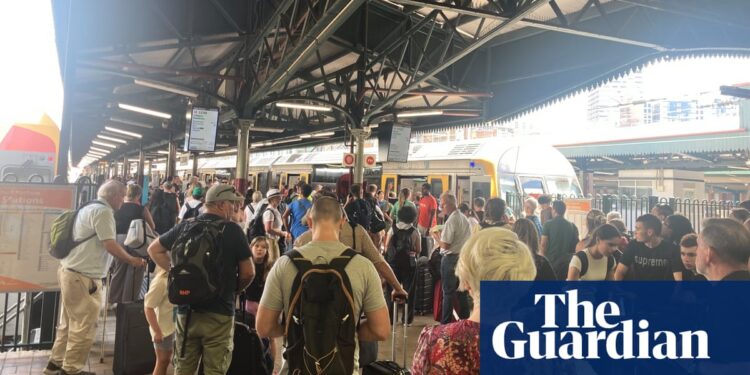Sydneysiders have been warned that more than 1,000 train services are expected to be cancelled by the end of Wednesday while those that do run could suffer hours-long delays, as the state government vows to explore legal action to quash “intolerable” industrial action from continuing into Thursday.
By Wednesday afternoon, about 400 services had been cancelled, with less than 20% of services having run on time or at all. The T4 Eastern Suburbs and Illawarra, T1 North Shore and Western and T8 Airport and South lines had been the worst affected by work bans from combined rail unions.
The chaos wrought havoc throughout the morning, leading to long queues for bus alternatives and other reports of 40 minutes to travel between two suburban stations, with trains routinely stuck on platforms due to shortages of rail workers to staff them.
However, transport authorities said disruptions were set to worsen later in the day and further deteriorate on Thursday if certain work bans, especially to do with maintenance, continued to be observed.
New South Wales transport minister Jo Haylen described the unions as a “boa constrictor strangling” the train network, with the consequences of the work bans “intolerable”.
Acting premier Penny Sharpe said the work bans in force on Wednesday had led to “serious impacts” across Sydney for commuters and businesses, and that “we’re currently looking at all of our legal options to make sure that these conditions can be rolled back and that we can get the trains back running on time”.
Sydneysiders with critical travel over the rest of the day were told to begin their journeys as soon as possible, with the transport department warning train delays were expected to get worse on Wednesday evening and that the evening peak period would be unreliable.
“As we look towards the afternoon and evening, the scenario is going to get worse in terms of train and crew availability, and we also see some inclement weather on the horizon, which may make afternoon travel even more difficult,” transport department secretary Josh Murray said.
“We are saying to vulnerable travellers, we are saying to emergency workers or those that have critical travel this afternoon, to leave now, to make those arrangements and not rely on afternoon peak services,” Murray said.
The Electrical Trades Union’s (ETU) refusal to conduct maintenance overnight on Tuesday was responsible for significant delays earlier on Wednesday, according to Sydney Trains’ chief executive, Matt Longland. But actions by several of the combined rail unions – stuck in negotiations with the government for a new pay deal – were contributing to the disruptions.
Longland said he had received advice from the ETU that it intended to continue maintenance bans on Wednesday evening, an indication the commuter chaos would continue on Thursday.
after newsletter promotion
Commuters turned to other modes of transport, with long queues for buses forming outside some train hubs, including Bondi Junction station, while Metro services – which are separate to the train network work bans – were increased to cope with extra demand.
One of the bans in place on Wednesday was an order for drivers to operate trains slower than necessary – a speed level that has gradually decreased as the pay dispute continues.
The impact of the work bans was felt across the state, with one of the daily Bathurst Bullet services cancelled and replaced with buses between Lithgow and Bathurst.
The fresh industrial action came as the combined rail unions considered an improved pay offer from the state government.
Eight months into negotiations for a new pay deal, and amid proceedings in the Fair Work Commission and federal court, Haylen announced an offer of an improved 13% pay rise plus 1% efficiency rise and 1% super rise across four years – much lower than the combined rail unions’ demands of 32% over four years.
Haylen said the sweetened offer, made public this week, was made possible by an agreement to merge the two state bodies that run Sydney trains and regional trains over the next four years. The merger was expected to drive productivity gains and financial savings – including from possible job cuts – that would fund an additional 1% rise.
Haylen urged rail unions to “act in the interests of taxpayers” and consider what she described as the government’s “final offer”.
Rail unions have until Thursday to consider the offer.
Toby Warnes, the NSW secretary of the Rail, Tram and Bus Union, appeared lukewarm on the proposal. “We’re a little bit perturbed by the fact that the government only managed to find 1% in savings from it, and that those 1% only came from job losses,” he said.
“So that’s obviously something we’re not extremely happy about. I don’t think 13% over four years is going to cut it.”
The FWC cannot be asked to settle the substantive dispute – pay and conditions – until February.






